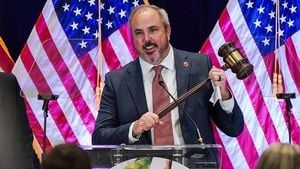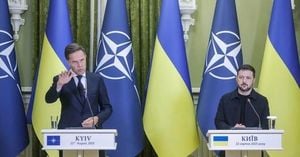In a move that has sent ripples through the global trade community, US President Donald Trump’s administration imposed a staggering 50 percent tariff on Indian goods in July 2025, citing India’s continued imports of Russian oil. The decision, which doubled an initial 25 percent tariff announced just days earlier, has drawn sharp criticism from leading economists and sparked concerns about the future of US-India relations and the broader international order.
At the forefront of the criticism is renowned economist and Columbia University professor Jeffrey Sachs, who has lambasted the Trump administration’s tariff policy as not only "bizarre" but also "destructive for the US economy and foreign policy interests." Speaking to ANI, Sachs described the move as "a shocking level of incompetence," explaining, "I see incompetence in the US government, I'm never surprised, but I'd say that this reached this level that I have to admit actually surprised me." According to Economic Times, Sachs went so far as to call the tariffs a “pressure tactic” on New Delhi that risks undermining years of progress in bilateral relations.
The saga began on April 2, 2025, when President Trump signed an executive order for reciprocal tariffs on various trade partners, imposing duties ranging from 10 to 50 percent. Initially, these tariffs were kept in abeyance for 90 days, with a 10 percent baseline tariff, to allow time for trade negotiations. The original deadline of July 9 was later extended to August 1, but just ahead of this revised date, Trump announced the first wave of 25 percent tariffs on Indian goods, only to double them days later. The escalation came at a particularly sensitive time, with both countries in the midst of negotiations for a Bilateral Trade Agreement (BTA) that had been initiated in March 2025.
Sachs did not mince words about the broader implications of Trump’s approach. "Putting on the surcharge on India, was stupid as could be from any norm. It serves no purpose," he told ANI. He further warned that the tariffs could face serious legal challenges, pointing out, "Tariffs are wrong in that they're destructive for the US economy. It violates international law. It's a breakdown of our political system in the United States. We have a constitution. We don't have one-person rule." He highlighted that there is already a lawsuit in the US Appellate Court alleging that Trump violated the law by imposing these tariffs, with a real possibility that the entire tariff regime could be deemed unconstitutional.
From an economic and geopolitical perspective, Sachs argued that Trump’s tariff policies are "doomed to fail." He explained to Economic Times, "They will not improve the US economy. They will isolate the United States geopolitically. They will strengthen the BRICS and other groups." The reference to BRICS—the bloc comprising Brazil, Russia, India, China, and South Africa—underscored a key theme in Sachs’s analysis: that Trump’s actions are pushing emerging economies closer together, fostering a multipolar world order rather than reinforcing US dominance.
Sachs elaborated on this point, stating, "Trump hates the BRICS. Why? Because they stand up and say to the US, you don't run the world. The world is multipolar and we want to cooperate with you, but we don't want you to run the world. President Lula summarized it best. He said, we don't want an emperor. This is basically the point. Trump thinks he's an emperor." The sentiment was echoed in ANI’s coverage, which highlighted Sachs’s view that the US has long exercised dominant power and now assumes it can "boss around every other part of the world."
On the diplomatic front, Sachs praised India’s measured response to the escalating trade tensions. "India's right. Take a deep breath. Don't do anything dramatic. Don't get too vituperative. I personally would do exactly what Prime Minister Modi's doing. He's flying to meet with President Xi Jinping. He's meeting with President Putin. He's meeting with President Lula. Those are India's real partners, by the way," Sachs advised, as reported by ANI. He emphasized that BRICS nations represent not only the fast-growing part of the world economy but also a collective commitment to multipolarity and multilateralism.
This approach aligns with India’s broader diplomatic strategy, which, according to Sachs, should prioritize independent relations with major global players. "India is so big, so important, such a great power. It should say we don't ally the United States against China. We have our own relations. We need our bilateral relations with China," he stated. Sachs also stressed that issues between India and Pakistan should be addressed bilaterally, ruling out any external mediation.
Meanwhile, the Indian government has taken a cautious but proactive stance. Commerce and Industry Minister Piyush Goyal told Parliament in August 2025 that the government is "examining the impact of tariffs and will take all necessary steps to safeguard the national interest." The ongoing BTA talks, which began in March 2025, are seen as a critical avenue for resolving trade disputes and building a more stable economic partnership. The US, for its part, is pushing for greater access to India’s sensitive agriculture and dairy sectors—industries that provide livelihoods to millions of Indians and are politically sensitive.
The legal battle over the tariffs adds another layer of complexity. Sachs pointed to the powers of the US Congress under Article I, Section 8 of the Constitution, noting that trade policy is supposed to be a congressional prerogative, not a matter for unilateral executive action. "There's actually a lawsuit now in the US Appellate Court, which says that Trump has violated the law by imposing these tariffs. There's a real possibility that Trump's entire tariff regime will be deemed, as it should be, unconstitutional," Sachs reiterated, as reported by Economic Times and ANI.
As the world watches the unfolding drama, the stakes are high not only for US-India relations but for the global trading system as a whole. The tariffs have cast a shadow over what had been a period of growing cooperation between the two democracies, and the outcome of both the legal challenge and the ongoing trade talks could set important precedents for how major economies engage in an era of shifting power dynamics.
For now, India’s restrained but resolute response—emphasizing dialogue, legal review, and multilateral engagement—seems to be winning praise from international observers. Whether this approach will yield a breakthrough or simply buy time in a rapidly changing world remains to be seen.



